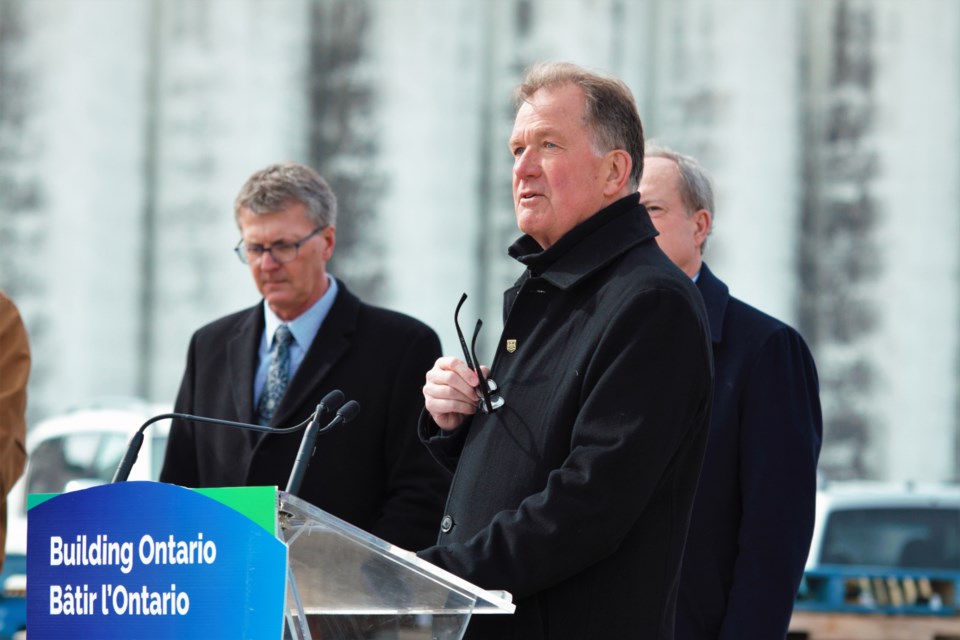THUNDER BAY — Two high-profile provincial ministers visited Thunder Bay last week, promoting new dollars included in the Ford government’s 2023 budget meant to support mining exploration and development.
The visit also highlighted recent tensions with some First Nations leaders over the government’s approach to mining, with a representative of Gull Bay First Nation speaking out at a press conference on the community’s concerns over new mining exploration in its traditional territory.
Finance Minister Peter Bethlenfalvy and Mines Minister George Pirie were on hand alongside local MPP Kevin Holland and mining industry players for a media event held in Thunder Bay at Green Technology Metals on April 19.
The two ministers promoted new funding for the Ontario Junior Exploration Program that was included in the 2023 budget.
The budget heralded a $6-million expansion to the program, bringing its total budget to $35 million.
Pirie said the investment is part of the government’s plan to “unlock” more mining activity through both spending and regulatory changes — moves he said would bring prosperity to all parts of the province.
“This is all about securing the supply chain to secure the critical minerals to marry the battery revolution that’s happening right here in southern Ontario,” he said. “We are linked. It’s the perfect marriage.”
Launched in 2021, the junior exploration program sees the government cover up to 50 per cent of eligible early exploration costs for junior mining companies, to a maximum of $200,000 per project.
The government reported that around $7.5 million invested through the program had leveraged $17.5 million in investment from 48 junior exploration companies so far.
The funding is intended to help locate more critical mineral deposits such as nickel, cobalt, and lithium, in a bid to grow the province’s supply chain related to the growing electric vehicle (EV) market.
Chief operating officer Matt Herbert of Green Technology Metals welcomed the new funding, though he said his company’s market cap now exceeded the program’s $100-million limit, making it ineligible.
In his remarks, Pirie pointed to Green Technology Metals’ lithium exploration efforts, which include the company’s “flagship” Seymour deposit being explored in the Armstrong region.
“We are working with industry to make Thunder Bay the destination for investment in exploration,” he said. “Thunder Bay is set to be a lithium hub, because we’ve got the lithium projects in this vicinity. But these exciting projects can’t get started unless we find the deposits and prove the project has strong economics.”
Beth Boon, a special advisor to the chief and council of Kiashke Zaaging Anishinaabek, also known as Gull Bay First Nation, spoke out at the press conference, saying the lithium exploration at the Seymour site was an example of the province’s failed system for consultation.
She said her community had previously been unaware of the exploration activity, which she stated is taking place on the First Nation’s traditional territory.
“We’ve had no advance notice, no advance material for a company that’s obviously already active in our territory, or in a territory to which we have overlapping interest and… watershed concerns,” she said in an interview.
Green Technology Metals declined to provide an interview or comment on concerns raised by Boon, saying it will communicate directly with communities related to the Seymour project.
Boon's comments echo recent calls from some other First Nations leaders, who have said they receive inadequate notice of exploration activities on their traditional territory and need to be full partners in mining development in their traditional territories.
Boon added her community is not necessarily opposed to responsible mine development, and welcomes more funds to support junior exploration companies.
“Gull Bay has an appreciation for that,” she said. “We have no desire to be seen as a community whose sole existence is to put roadblocks in the way of folks who have serious plans.”
However, she said that must be accompanied by more funding for Indigenous communities to participate more actively in the process to ensure a level playing field.
“If they intend to truly support these critical mining industry proponents, they have to spend a commensurate amount of money conducting consultation,” she said. “Without the consultation, the proponent ends up frustrated, the public doesn’t have a good understanding of what’s going on, and we see negative impacts to our nation on a public relations [front].”
Jamie Taylor, the CEO of the Thunder Bay CEDC, said with over 500 mining supply and services companies in the city, any boost to mining exploration can have a big impact.
“Exploration is an expensive venture that doesn’t always result in success, so investment from the province in kind of de-risking that is welcome — because the spending will continue, and a lot of that spending will benefit Thunder Bay,” she said.
In terms of what more governments can do to support mining development, Taylor said the CEDC would welcome targetted supports to help the sector address labour shortages
“We are hearing from companies that is still their number one challenge,” she said.
Pirie added the government’s proposed changes to the Mining Act will “break down barriers that are holding our sector back, without compromising our world-class environmental standards or the Indigenous consultation process.”
Critics, including NDP MPPs, have called for more robust environmental safeguards and requirements for consultation with First Nations in the government’s proposed bill.
— TBnewswatch




